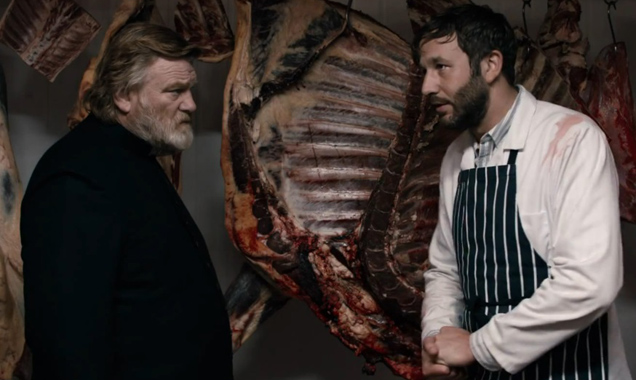Reviewed by GREG KING
Director: John Michael McDonagh
Stars: Brendan Gleeson, Chris O’Dowd, Kelly Reilly, Dylan Moran, Aidan Gillen, Domhnall Gleeson, M Emmett Walsh, Killian Scott, Isaach De Bankole, Marie-Josie Croze, David Wilmot, Pat Shortt, Gary Lydon, Owen Sharpe, Orla O’Rourke.
This film has one of the best opening lines for quite some time. “I first tasted semen when I was seven years old,” an unnamed man tells Catholic priest Father James Lavelle (Brendon Gleeson) in the confession box. Father James listens as the man than tells him that he was raped by a priest at the age of seven, a shocking abuse that lasted for several years. The person’s life is something of a mess, and rather than absolution he is going to kill a priest. And not a bad priest as that is too much of a cliche. Rather he is going to kill a good priest as that will make a bigger statement. And then he announces that he will kill Father James on the beach in seven days, following the Sabbath, giving the priest time to get his affairs in order.
During the next week Father James stoically tries to go about his duties, ministering to his flock, many of whom have issues with the church in general and with how difficult their lives are. Father James agonises over what the best course of action is. Father James is a widower who came late to the church, but he has common sense and tries to offer comfort and wisdom to his parishioners. But as the week wears on his frustrations and doubts take control of his easy going nature.
Father James thinks that he recognises the voice of his persecutor, but the audience are deliberately left in the dark. Calvary is a bit like an Agatha Christie mystery, but rather than a whodunnit this is more of a who’s going to do it, as writer/director John Michael McDonagh (The Guard) describes it. We meet a number of potential suspects, morally bankrupt locals who challenge his authority and beliefs. These locals range from Jack (Chris O’Dowd), the cuckolded local butcher; through to Fitzgerald (Dylan Moran) the corrupt businessman in financial difficulties desperately looking for a way out of his troubles; the cynical proudly atheist local doctor Harte (Aiden Gillan); and Milo (Killian Scott), a virginal young man struggling to find his place in this small claustrophobic community and who thinks the best way of proving himself is by joining the army.
Father James passes his concerns onto the corrupt local police inspector (Gary Lydon, reprising his role from The Guard), but he is unable to offer much in the way of helpful assistance. To further add to Father James’ turbulent week is a visit from his daughter Fiona (Kelly Reilly), who has recently attempted suicide over personal disappointment; a reclusive and aging writer who seeks James’ advice and assistance (M Emmett Walsh) in ending his life on his terms; and his increasingly fractious relationship with Father Leary (David Wilmot), his fellow priest. Out of guilt the troubled priest also pays a visit to Freddie Joyce (played by Gleeson’s own son Domhnall, recently seen in the offbeat comedy Frank, etc), an unrepentant rapist and mass murdering cannibal.
Like his brother Martin McDonagh (In Bruges, Seven Psychopaths), playwright turned film director McDonagh has a black and bleak comic sensibility that permeates the caustic and uncompromising material here. While he scratches away at the fabric of Irish society, McDonagh’s script also explores some topical themes such as the scandals surrounding the sexual abuses committed by Catholic priests, Catholic guilt, depression, the nature of a small community, small town morality, sacrifice, redemption, faith, hope and integrity. A slowly mounting sense of dread also permeates the material.
As a playwright, McDonagh loves language, and Calvary is heavily dialogue driven with lots of existential discussions about serious moral issues, and some witty exchanges. It slowly becomes a tragic passion play by the end. And the final shot is enigmatic and will have you reevaluating what you have seen.
Calvary reunites McDonagh with Gleeson, the star of The Guard, and he seems to draw the best out of the usually reliable star, who rarely delivers a lazy performance. Gleeson is superb as the flawed Father James, a man with a troubled and colourful past, who seems unable to assuage his emotional conflict. It is a fairly passive performance from the larger than life Gleeson, but the psychological effects of his torment, his troubled emotions and insecurity and worries all play out across his weathered but expressive face.
The local villagers are all sharply drawn by McDonagh, and he has made some interesting casting choices to flesh out these characters. O’Dowd and Moran are better known for their comedy roles, but here they play against type with more dramatic performances. Reilly is touching and vulnerable as Father James’ troubled daughter.
The film has been beautifully shot on location by cinematographer Larry Clark, who also shot McDonagh’s The Guard, and whose widescreen lensing here captures the sombre beauty of this picturesque windswept coastal village. Patrick Cassidy’s score is moving and melancholy and perfectly suits the bleak tone of the material.
This tale of a beleaguered priest is the second film in McDonagh’s proposed Irish trilogy, but it is not as immediately accessible or as entertaining as his previous film, the brilliant black comedy crime thriller The Guard.
★★★☆




